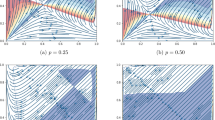Abstract
The purpose of the present paper is to reveal some conformities to natural universal laws allowing to advance the theory of evolutionary economics. The second law of thermodynamics, Le Chatelie–Brown principle as universal laws are applied for nonlinear dynamical economic systems. The ergodic hypothesis is applied for dynamical economic systems as one from principles of economic forecasting. From the point of view of statistical physics, entropy is applied as universal function of a condition for economic systems. The evolution of economic dynamical systems at macro and microeconomic levels from the point of view of thermodynamics, statistical physics, and diffusion processes is investigated. The law of money circulation is formulated as one of the forms of display of energy conservation law in economic space. The concept of parametric economic space is introduced. The concepts of energy and number of degrees of freedom of a dynamical economic system allow substantiated cause and effect connections between the evolution of the system and a number of economic factors (forces), influencing on the system (degree of an openness, “freedom” of an economic system). The character of the development of technologies and the product life cycle are investigated as a nonlinear economic process. The concept of a wave function describing a technological wave connected with the entropy of a system of economic “cells” is introduced.
Similar content being viewed by others
REFERENCES
Andreeva, O.D. (1997). Technology of business, marketing. Moscow: Infra, M-Norma.
Baklanov, I.G. (1998). Dialectics of telecommunication technology. Vestnik Svyazi, 926–28.
Georgescu-Roegen, N. (1971). The entropy law and the economic process. Cambridge: Harvard University Press.
Maevsky, V.I (1997). The evolution of macrogenerations and modern macroeconomic theories. In L. Abalkin, V. Makarov, V. Maevsky, M. Berezovskaya (Eds.), Evolutionary Economics on the brink of XXI century (p. 76). Moscow: Japan Today Press.
Maevsky, V. I, & Kazhdan, M. (1998). The evolution of macrogenerations. Journal of Evolutionary Economics, 8, 407–422.
Matveev, A.N. (1981). Molecular physics. Moscow: Visshaya shkola.
Reif, F. (1972). Statistical Physics. Moscow: Nauka.
Sadtchenko, K.V. (1997). Ergodic hypothesis for economic system. In L. Abalkin, V. Makarov, V. Maevsky, M. Berezovskaya (Eds.), Evolutionary Economics on the brink of XXI century (p. 123). Moscow: Japan Today Press.
Sadtchenko, K.V. (1999). The vector of evolution of an open society. In A. Buzgalin (Eds.), Strategy of outstripping development for Russia in XXI century (v. 4, 41–42). Moscow: Dialog-MGU.
Sivukhin, D.V. (1979). Thermodynamics and molecular physics (2nd edition). Moscow: Nauka.
Author information
Authors and Affiliations
Rights and permissions
About this article
Cite this article
Sadtchenko, K. Universal Laws in Application to Evolutionary Economics. Nonlinear Dynamics Psychol Life Sci 6, 121–135 (2002). https://doi.org/10.1023/A:1014058110909
Issue Date:
DOI: https://doi.org/10.1023/A:1014058110909




